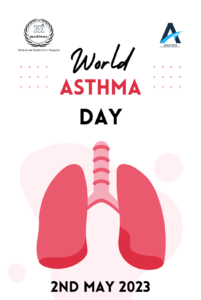Breathing Easy: Managing Asthma on World Asthma Day
As the world observes World Asthma Day, it’s important to recognize the impact that this chronic respiratory disease has on millions of people worldwide. Asthma affects people of all ages and can have a significant impact on their quality of life. As a healthcare professional, I feel it’s crucial to spread awareness about this condition and provide resources to help individuals manage their symptoms effectively.
According to the Global Asthma Report 2018, an estimated 339 million people worldwide suffer from asthma, and the prevalence of the disease is rising. While there is no cure for asthma, it can be managed through proper treatment and self-care measures. Medications such as inhalers, nebulizers, and corticosteroids can help reduce inflammation and open up the airways, making it easier to breathe. Additionally, avoiding triggers such as allergens, air pollution, and respiratory infections can help prevent asthma attacks.
It’s essential to educate individuals with asthma and their families about the disease and how to manage it. The Global Initiative for Asthma (GINA) provides evidence-based guidelines for asthma management that can help improve outcomes for patients. GINA recommends that individuals with asthma have a written asthma action plan that outlines the steps to take in case of an asthma attack. This plan should include the individual’s medication regimen, triggers to avoid, and emergency contact information.
In addition to medical treatment, lifestyle changes such as exercise, a healthy diet, and stress management can help individuals manage their asthma symptoms. A study published in the Journal of Asthma and Allergy found that regular exercise can improve lung function and reduce the risk of asthma attacks. Furthermore, stress and anxiety can exacerbate asthma symptoms, so practicing stress-reduction techniques such as yoga or meditation can be helpful.
In conclusion, as we observe World Asthma Day, it’s essential to raise awareness about asthma and provide resources to help individuals manage their symptoms effectively. As a healthcare professional, I encourage individuals with asthma to work with their healthcare providers to develop an asthma management plan that fits their needs. By taking proactive steps to manage asthma, individuals can improve their quality of life and reduce the risk of complications.
References:
- Global Asthma Report 2018. Global Asthma Network. https://www.globalasthmareport.org/Global%20Asthma%20Report%202018.pdf
- Global Initiative for Asthma. Global Strategy for Asthma Management and Prevention. https://ginasthma.org/wp-content/uploads/2021/05/GINA-Main-Report-2021-V2-WMS.pdf
- Eichenberger PA, Diener SN, Kofmehl R, Spengler CM. Effects of exercise training on airway hyperreactivity in asthma: a systematic review and meta-analysis. J Asthma Allergy. 2013;6:15-28. doi:10.2147/JAA.S32298
CLICK HERE TO READ OUR ISSUES OF THE MAGAZINE
CLICK HERE TO READ OUR ISSUES OF THE NEWSLETTER

Written By:
